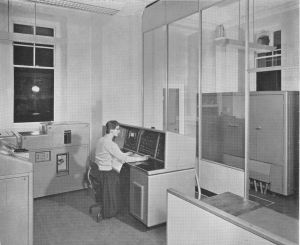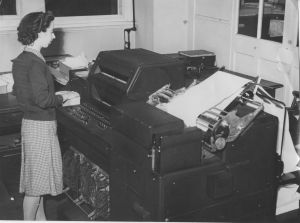Last week I goaded a couple of male colleagues into posting a (deliberately provocative) thread on the archives2.0 ning forum linking the high proportion of women in the archives profession (at least this is the case in the UK) with a slow take-up of web2.0 technologies. From the ensuing discussion, it appears nobody really agrees with this premise, so maybe we need to change the title of the thread!
However, it did catch the attention of a colleague who works at the Dutch Institute of Women’s History, and hence has a particular interest in gender issues. She points out that my blog header includes a picture of a woman with an early computer. Indeed, there are two women in the header pictured with computers – so I thought as an August bank holiday kind of post, I would tell you a little about both of them.
As it happens, I know quite a lot about the woman in the oldest photograph:

Miss Rowena Wilby with the West Riding County Council's 'Electronic Brain' January 1958
Her name is Rowena Wilby, and she was just 18 when this photograph was taken for a press call to announce the arrival of the West Riding County Council’s new ‘Electronic Brain’ in January 1958. In 1955, (a full two years before a government grant provided Leeds University with its first computer), the Council had resolved “that an order be placed immediately with the British Tabulating Machine Company Ltd. for a Hollerith Electronic Computer, at an estimated cost of £28,000”[1]. The West Riding was the first local authority to order a HEC-4 (Type 1201) computer, which was duly delivered in December 1957.
As well as photographs of the new computer, which was used primarily for payroll and the occasional calculation for the Highways Department, West Yorkshire Archive Service, Wakefield also holds a diary which documents the installation of the new computer at County Hall, Wakefield. It appears to have been something of a temperamental beast, frequently ‘jumping out of programme’ and requiring constant attention:

Diary recording the installation of the West Riding County Council's first electronic computer, 1958
Unfortunately, it seems unlikely that Miss Wilby played a major part in the arrival of computing to West Yorkshire. The Council minutes record the names of those chosen for special training at the premises of the British Tabulating Machine Co., and none of them are women. It is more probable that Rowena Wilby was recruited as a photogenic candidate from amongst the ranks of a small army of female card punchers and tabulating machine operators who had been employed in the West Riding Treasurer’s Department since before the second world war:

Punching cards at County Hall, Wakefield. Annoyingly, I can't quite read the date on the calendar in the room! Probably 1940s or 1950s.

Woman with a Holllerith Machine at County Hall, Wakefield. Not dated. 1940s or 1950s.
About the second woman in the blog header, I know rather less, except that this was one of a series of posed photographs taken sometime in the 1980s to illustrate the history of computing at West Yorkshire Police. The West Riding Constabulary was one of the first departments to book computer time on the County Council’s Type 1201, and in time their needs grew to the extent that the police acquired their own computer. This photograph shows a civilian police officer using the UNIVAC computer which was in use in the 1980s:

Civilian police officer with UNIVAC computer, 1980s
All images reproduced by permission of West Yorkshire Archive Service.
[1] West Riding County Council minutes 19 October 1955 – West Yorkshire Archive Service, Wakefield: WR/52 p.242. The ‘Purchasing Power’ calculator at http://measuringworth.com/calculators/ppoweruk/ estimates £28,000 in 1955 to be the equivalent of just over half a million pounds in today’s terms.
Read Full Post »




